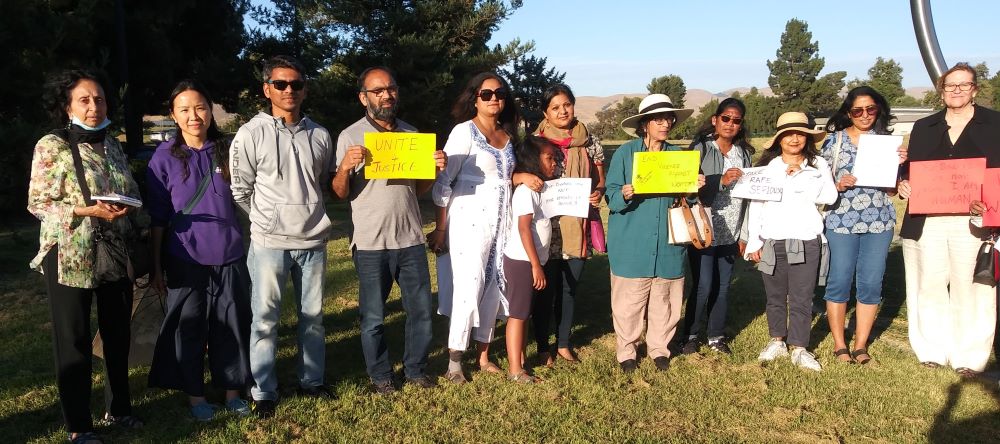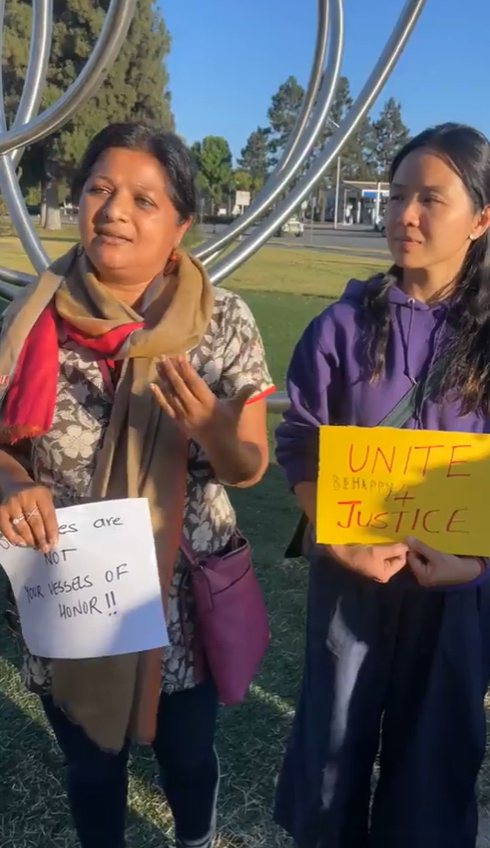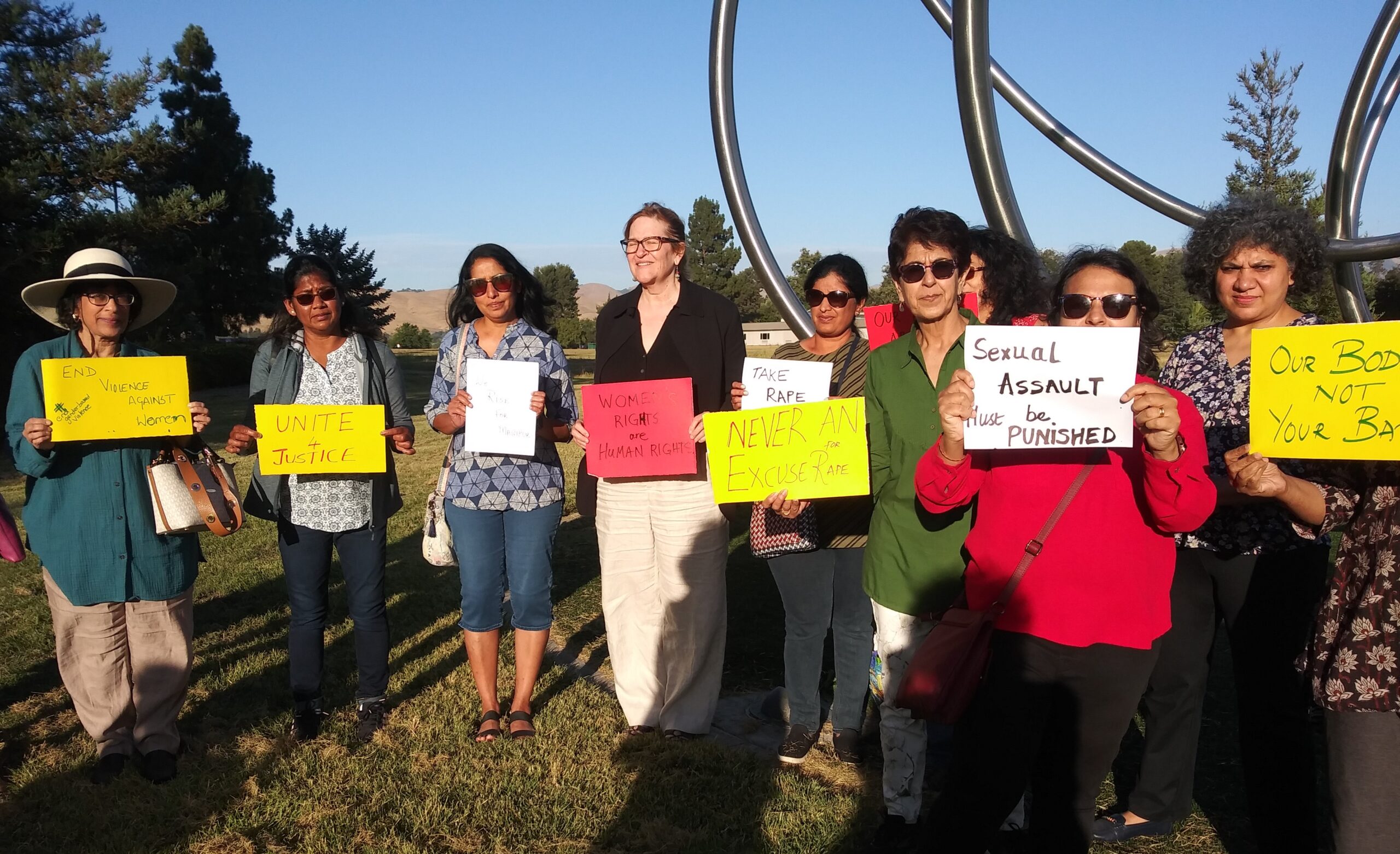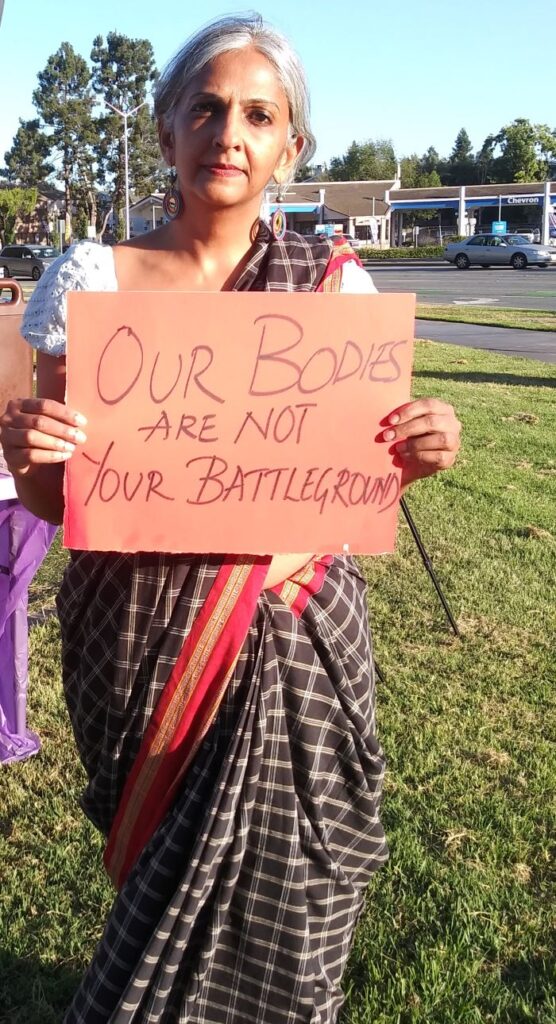FREMONT, California — A group of women, with a few men among them, gathered at the Unity Sculpture at Fremont’s Lake Elizabeth July 27 evening to express solidarity with the women of India, whose vulnerabilities to violence without recourse were exposed after a heinous attack in the northeast state of Manipur.
Similar demonstrations have been staged around the world by the Indian diaspora. In London, a group of protestors marched to Parliament Square, and engaged in a silent vigil near a statue of Mahatma Gandhi. Justice for All in Canada have planned protests around the country this weekend. And another demonstration will be held here July 30, at 11 am.
“When I heard that tribal women had been kidnapped, attacked, and raped, I was shocked, but not surprised. Violence against women has been swept under the rug, not only in India but around the world,” said longtime women’s rights activist Viji Sundaram, who spearheaded the Fremont demonstration.
Three San Francisco Bay Area anti-domestic violence organizations collaborated to stage the event, including: Maitri, Narika, and Safe Alternatives to Violent Environments. The organization Indian Business and Professional Women, founded by Deepka Lalwani, also participated and got several local politicians on board for the protest. Organizers said the demonstration aimed to be apolitical, and non-partisan.
On May 4, two tribal women in Manipur were kidnapped, stripped, and paraded naked through their village. A mob of hundreds of men looked on, cheered, and filmed the attack. Both women were sexually assaulted; the younger woman was gang-raped.
Though the victims filed complaints with police, no investigation was undertaken. The victims also filed a complaint June 12 with India’s National Commission on Women, which also did not respond.
On July 19, a graphic video of the attack was released, shocking India and the diaspora. Prime Minister Narendra Modi spoke a day later, calling the atrocity shameful. “What has happened to the daughters of Manipur can never be forgiven. The guilty will not be spared,” he said.
The National Commission on Women chief Rekha Sharma finally met with the victims July 26. Four suspects were arrested last week.
“Why did it take Modi 78 days to respond?” queried Sundaram — co-founder of the anti-domestic violence organization Narika — at the rally.

“Humanity has been severely torn to pieces in the state of Manipur,” said Papiha Nandy, executive director of the organization Lead in Heels. “It is appalling to see men cheering while this attack was happening.”
“Women all over the world are violated, but lack avenues for recourse,” said Geetha Krishnamurthy, president of Maitri’s board of directors. “People need to stop using women’s bodies as political battlefields. Our bodies are not your battlegrounds. You cannot violate a woman to punish someone else,” she said.
The brutal attack came amid months-long clashes between warring tribal factions, the Meiteis, who are Hindus, and the Kukis, who are mostly Christian.
“Violence against women in India and around the world has been non-stop. This incident was exposed, but of course there are thousands more where women have had to live with the brutality and shame in silence,” said Shailaja Dixit, executive director of Narika. She called for a moment of silence in which participants at the demonstration could process their grief.
Dixit, who grew up in New Delhi, said that sexual assault was commonplace for Indian women, who face groping on public transportation, also known as eve teasing. “We must think about how to create a society more equitable for the women of Manipur, and women around the world,” she said.

Chao Lee, development manager at SAVE, is a survivor of domestic violence. “It breaks my heart to see women being violated in this very public way,” she said through tears. “I am angry. I am enraged,” she said, as her young daughter clung to her.
Martha Krieger is the district representative for California state Senator Aisha Wahab, the first South Asian American woman in the California state Legislature. She spoke about SB 464, the Sexual Assault Survivor’s Bill of Rights, spearheaded by Wahab, which would add protections for victims of violence.
“We currently put victims through a really tough process after their assault. This bill would get someone in with them right away and ensure that their case is processed in a timely manner,” said Krieger.
Fremont city councilman Raj Salwan did not attend the event in person, but sent a message of solidarity, which was read out by Lalwani. “The women of Manipur, like women everywhere, deserve to live in a society that respects their dignity, protects their rights, and upholds their fundamental freedoms. Yet, they were subjected to an appalling display of violence and humiliation.”
“It is a stark reminder that despite the progress we have made as a society, there is still much work to be done. We must ensure that the survivors of this horrific incident receive justice and support,” said Salwan.





